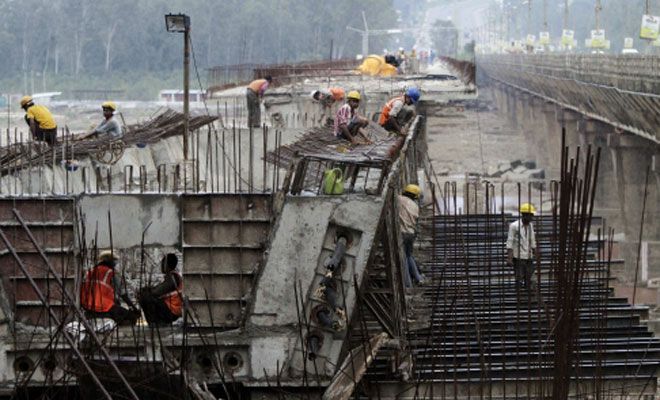 There is little doubt the government is coming around to the realisation that manufacturing is crucial to India's economic recovery.
There is little doubt the government is coming around to the realisation that manufacturing is crucial to India's economic recovery.
In his maiden Independence Day speech Prime Minister Narendra Modi stressed on the need to make quality products within the country and reduce their imports.
The prime minister said his long-term vision was to transform India into a manufacturing powerhouse.
Taking this vision to the next level, the government set up a high-level team on Saturday to review the problems of a large number of stalled economic zone projects across the country.
These special economic zones, or SEZs, were meant to be tax-free industrial enclaves with reliable electricity, water and road network to boost manufacturing.
Instead, a large number of them are hanging fire because of regulatory concerns.
Senior officials say the government is assessing the situation and it might come up with an incentive package for the SEZs following the release of Foreign Trade Policy.
Officials also say in the Foreign Trade Policy, which will be effective for the next five years over 2014-2019, the government might announce several tariff concessions like those given to units operating outside the SEZs under the Free Trade Agreement route.
The main bone of contention for SEZ developers has been the imposition of the minimum alternate tax, or MAT, and the dividend distribution tax, or DDT.
The proposal to impose 18.5 per cent MAT on the book profits of both the SEZ developer and the units located in these enclaves was announced by the United Progressive Alliance government in the Budget for 2011-12.
The proposal to impose MAT and DDT on SEZs was introduced in the Finance Act even though the SEZ Act specifically mentions the stipulated tax holiday given to these zones.
Despite protests from SEZs and unit developers, the taxes came into effect in April 2012.
Prior to this, SEZ developers and units were exempted from MAT in accordance with Section 115JB(6) of the Income Tax Act, 1961.
The move left the developers, who had invested huge amounts in SEZ projects based on the tax incentives offered by the government under the SEZ Act, high and dry.
In spite of the government moving to address some of the concerns faced by SEZ developers, many are still despondent over the future of SEZs.
"SEZs have turned out to be a necessary evil for the government. We do not see any future in these zones anymore. The SEZ Act came into effect in 2006. Ever since then every government, including the latest one, appears to be more active in killing the policy than reviving," says an industry representative who does not wish to be identified.
As things stand today, SEZ units enjoy 100 per cent income tax exemption on export income under Section 10AA of the Income Tax Act for the first five years and 50 per cent for the next five years thereafter.
However, the government has made it clear that it will not be able to abolish MAT and DDT completely. The Export Promotion Council for SEZs has suggested reducing the MAT and DDT rate to 7.5 per cent from around 20 per cent at present.
"The industry has brought to the attention of the finance ministry that none of the units is able to adjust the MAT paid at 18.5 per cent plus cess, within the stipulated period of 10 years, forcing the unutilised credit to lapse and become a tax burden during the tax-free regime."
"The SEZ sector has hence suggested reducing the rate to 7.5 per cent, which would have helped the government to earn taxes while allowing the units to get the entire amount adjusted within the stipulated 10 years," says PC Nambiar, chairman, Export Promotion Council for SEZs.
Nambiar, who was instrumental in establishing the country's first bio-pharma SEZ, has also written a letter to the finance minister urging a review of the policy since investments coming into SEZs have slowed significantly.
Apart from taxes, there are also several other issues plaguing SEZs.
The Central Board of Direct Taxes recently issued a circular clarifying that manpower will also be included in the clause that restricts the components that IT firms can move to their SEZ units. Till now, IT firms were allowed to move 20 per cent of their "plant and machinery" from the existing business to SEZs.
This is known as the 80:20 rule. This has invited sharp criticism from the IT industry.
Still not everyone feels SEZs aren't worth fighting for. According to Aradhna Aggarwal, director, Wadhwani Foundation Policy Research Centre, "If the government is really serious about getting foreign capital inflows, then one immediate step would be to revive SEZs. They need to be viewed as geographically concentrated agglomerations of internationally competitive enterprises that offer favourable business environment, including efficient infrastructure and quality services, few regulatory restrictions and a minimum of red tape."
Aggarwal also suggests that investor confidence in SEZs can be reinstated by invoking Section 51 of the SEZ Act that gives the provisions of the Act an overriding power over provisions in any other legislation. In order to prevent constant tweaking of the regulations governing SEZs, she suggests that the ministry of commerce and industry should have the sole right to propose changes in the SEZ Act.
.jpg?w=670&h=900)











